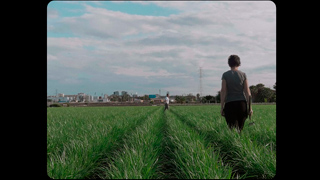Camagroga
 SPAIN / 2020 / Catalan / Color / DCP / 111 min
SPAIN / 2020 / Catalan / Color / DCP / 111 min
Director, Photography: Alfonso Amador
Script: Alfonso Amador, Sergi Dies
Editing: Sergi Dies
Sound: Jorge Salvà, José Serrador
Color Correction: Luis Aguilar
Producers: Alfonso Amador, Xavier Crespo
Source: Loverfilms, Dacsa Produccions
The region of Valencia in Spain is rich in irrigation agriculture. Under the house name of Camagroga, this family passes down the tradition of cultivating tiger nuts, used as food since the times of Ancient Egypt. The film covers exactly a year’s time with Antonio, his face carved with deep wrinkles and his hands large and burly, and his shy daughter Inma—as they ceaselessly work about the farm and maintain its operation. Few are left to carry on this farming tradition, and much of the area has succumbed to development, but we see the family’s sincere pride in their work through Marc, who uses a video camera to film the family farm for his school presentation and Inma, whose face full of pride speaks of her joy at being a farmer. This film not only conveys the dignity of those who continue to till the soil against the currents of contemporary society, but also tells the history of the land on which they work.
[Director’s Statement] Five years ago, when I decided to rent a land plot in the Huerta of Valencia, I just wanted rest from cinema. I just wanted to touch the earth, to watch the plants grow, to understand the seasons of the year.
It was by chance that I met Antonio Ramon, a farmer who hires part of his fields to amateur farmers. So he became my landlord. I listened to him talk about the land, about the history of the Huerta, about his life and his work; I looked at his hands and his wrinkles.
So I could not rest from cinema anymore: I had to make a movie.
For a year and a half, I worked side by side with Antonio and his daughter Inma, heir to his knowledge. Day after day, season after season. With my only tool, a camera, and an only task: I just wanted to film Antonio’s head, his sunburnt face, his hands, his artistry with the hoe.
Discoveries and ideas came later. I discovered that filming Antonio and Inma meant that I was filming a world that’s coming to an end: it was a political gesture. In the end, Camagroga, whose one and only declared purpose was sensual, seems to me to be a political film.
During the soothing process, the Huerta had to face the second last threat to its integrity: public works that dwarf it a little bit more, demolitions of houses full of history. Sometimes it seems Camagroga had been planned to serve this cause, but those images just seeped into the film without my will. I just wanted to film Antonio’s smile. His wrinkles, his hands, his artistry with the hoe.
 Alfonso Amador
Alfonso AmadorBorn in Madrid, Spain. Director, screenwriter and playwright. His second short film, 9’8 m/s2 (1998) was officially selected for the Cannes Film Festival. Winner of the Julio Alejandro Scriptwriting Prize (SGAE) in 2016. Has written and directed two feature films: Enxaneta (2011, fiction) and 50 Days in May (Rehearsal for a Revolution) (2012), a documentary on the Spanish anti-austerity movement. Short films include El presente (The Gift, 1995, Premio Luis Buñuel Villa de Madrid 1995), Todo lo que necesitas para hacer una película (All You Need to Make a Movie) (Best Script Alcalá de Henares 2002).
